FondMart's perspective on current events and developments across the globe - India’s covid-19 crisis and its impact on the clothing industry
May 11,2021
India’s covid-19 crisis has spiralled out of control
How coronavirus is affecting India’s clothing industry
How Did Chinese Government Implement Unconventional Measures Against COVID-19 Pneumonia
Actions taken by Chinese enterprises during Covid-19 Pandemic
Coronavirus: Will our day-to-day ever be the same? The good, the bad
India's innovations combating this Pandemic - its digital shift
E-commerce has grown two to five times faster than before the Pandemic
India’s covid-19 crisis has spiralled out of control
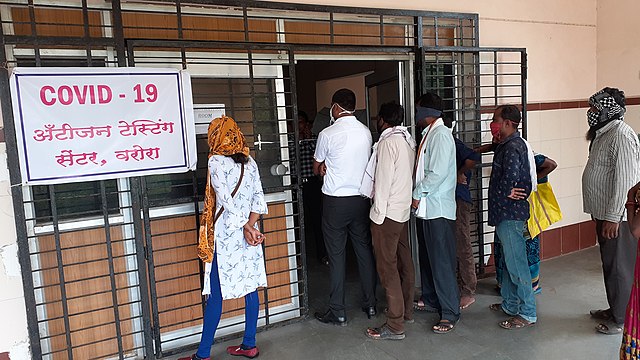
The acrid scent of burning bodies fills the air as dusk falls in the Indian capital. On the evening of April 26, seven funeral pyres are still burning at a small crematorium in a Delhi suburb. Gaurav Singh, a resident, said he had lived here his whole life and walk through this place twice a day but had never seen so many bodies combust at the same time. Time.com reported.
India's crisis has blown out of proportion to everything else witnessed during the Pandemic. India set new global records for regular COVID-19 infections for six of the seven days starting April 21, consistently surpassing the 300,000 counts previously set by the United States. Official estimates put the death toll at over 200,000, with 3,000 people die every day. According to Bhramar Mukherjee, an epidemiologist at the University of Michigan, the true daily death toll is at least two times greater, with a caseload possibly at least ten times higher, based on modelling of evidence from the first wave.
How coronavirus is affecting India’s clothing industry
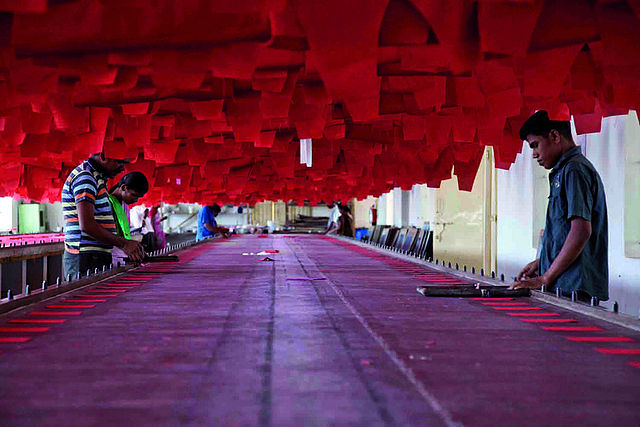
Let’s have a brief look at India’s clothing industry first. With a vast raw material and garment manufacturing base, India's textile industry is one of the world's biggest. India's economy is heavily reliant on textile production and commerce, second to Agriculture. Textile and garment exports account for about a quarter of all foreign exchange earnings. Making up for 3% of the country's GDP, the industry contributes approximately 8% to overall excise tax collection. This sector generates so much employment that it accounts for 21% of overall employment in the economy.
The garment manufacturing industry directly employs about 35 million workers. Indirect jobs, which include people working in agricultural-based raw-material processing, including cotton and associated trading and handling, are estimated to be about 60 million people.
The effect of the Pandemic's second wave on India is devastating. The Pandemic has impacted the bulk of India's export sector (the US and EU combined account for roughly 60% of India's overall apparel exports in terms of value), resulting in order cancellations/deferrals, inventory build-up, and the anticipation of slower realisation of export receivables. Domestic consumption is still being inhibited due to the nationwide shutdown. New shop openings have slowed, and even domestic retailers are experiencing an inventory build-up. Furthermore, if exporters dump their inventories in the domestic market, domestic prices could suffer, resulting in even lower margins. This could result in short-term blips such as fewer casual labour jobs, factory closures, and people returning to their hometowns.
How Did Chinese Government Implement Unconventional Measures Against COVID-19 Pneumonia
The spread of COVID-19 infection was made far less possible in China due to several interventions and measures
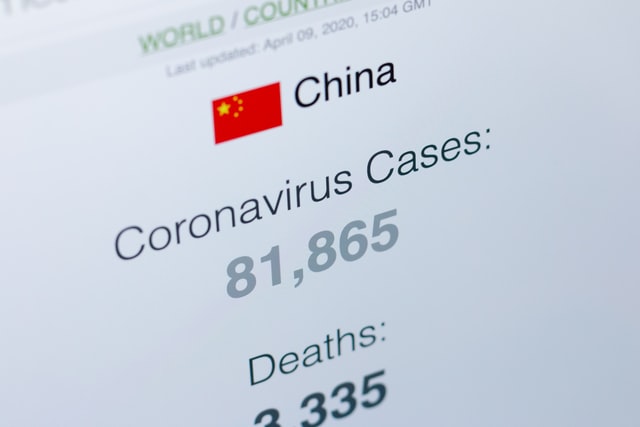
The cancellation of athletic activities and the closure of theatres were among the aggressive "social distancing" policies introduced throughout the nation. For the Lunar New Year, schools prolonged their holidays, which started in mid-January. Many companies have to lock their doors. All who went outside had to put on a mask.

AliPay and WeChat, two commonly popular cell phone applications that have effectively replaced cash in China, assisted in enforcing the restrictions because they enable the government to monitor people's activities and also prevent people with confirmed infections from travelling.
Cell phone colour codes, which mark a person's health status as green, yellow, or red, tell guards at train stations and other checkpoints who to allow in.
Actions taken by Chinese enterprises during Covid-19 Pandemic
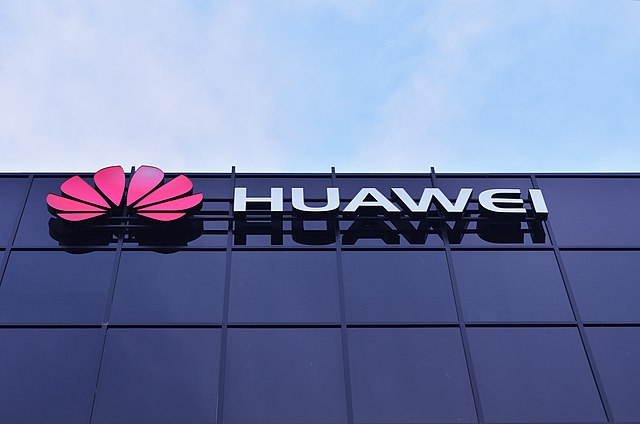
Alibaba, Bank of China, ByteDance, and other companies contributed large amounts of medical equipment and other materials to the impacted countries. To obtain further medical equipment, manufacturers set up improvised production lines. Huawei and China Telecom have developed a 5G-enabled digital video diagnostic centre, allowing doctors to hold remote online consultations with prospective patients. Alibaba, Tencent, Baidu, ZTE, JD.com, and iFLYEK have all applied big data technology in medical services. Furthermore, online epidemic information dissemination platforms, Artificial Intelligence (AI), temperature monitoring, and consultation platforms, AI-assisted radiological image interpretation, and intervention recommendations, big data analytics for epidemic prevention and control, and supercomputing have also been used to combat the epidemic.
Coronavirus: Will our day-to-day ever be the same? The good, the bad
The good: our community connections are hopefully becoming more meaningful
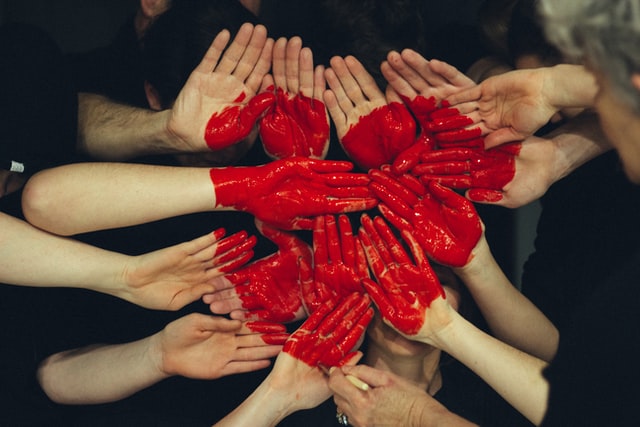
This Pandemic has brought up a slew of existential concerns, including racism, injustice, and the climate. But it has also shown the incredible strength of mutual responsibility and the possibility of transformative reform.
Adversity has shown us that we all have a role to play in our interconnected society, that we need to be more responsible, accountable, and compassionate, and that little things matter. To build spaces where we can work better together and with nature, we need to desire a more egalitarian world and then develop a more equitable paradigm around it. Places that foster a cooperative network and enable citizens to rediscover the art of living.
Covid may target our bodies, however distance and isolation pose a challenge to our culture's very foundation. We need to strengthen our societies' connectedness now more than ever to improve everyone's quality of life.
The bad: the travel industry will shrink

We've grown accustomed to Zoom's adequate world, and there are even more technological advancements on the way that will improve video meetings significantly. As simulated activities take over and erode the economies of the until-now-very lucrative market, the massive events business that spawns a lot of travel will not return to its complete physical glory of the past.
People are sleeping, walking, and commuting locally because foreign boundaries are expected to be closed in any way before the end of 2021, and short-term rentals like Airbnb are doing better than hotels. Domestic tourism, which is mostly supported by small locally run companies and is mostly overlooked by the massive travel marketing machinery in favour of big ticket foreign tours, is gaining momentum, and if people continue to value their local regions more in the coming years, that would benefit with a smaller footprint on a world that urgently requires it.
India's innovations combating this Pandemic - its digital shift
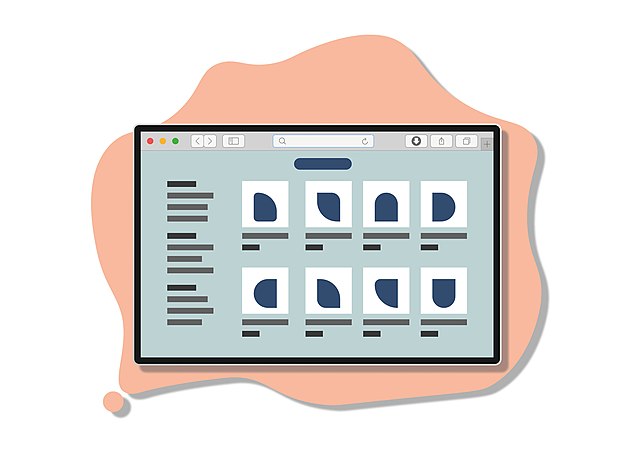
Clothes are one of life's most important necessities. To continue supplying these life essentials, India is shifting its textile and apparel business to the virtual world. Because of its simulated operations, there is no space for human or physical interaction. As a result, the lockdown imposed to combat the spread of the COVID-19 Pandemic has little impact on India's online garment industry. Revenues in the online textile industry increased in various cities and states across the country.
"It's going to accelerate the fashion industry's engagement with digital technology, and its desire to rethink the fashion calendar, but it will also accelerate the approach to sustainability and building responsible businesses. That means using supply chains that are creating clothing in a circular way and take into account the impact on the planet and the people who make our clothes." Quoted from Dame Anna Wintour, in her interview with BBC news.
The online textile industry has benefited greatly from the post-COVID-19 period. By 2021, e-retailers would have proven to be a game-changer by playing a critical position in the post-COVID revival of the Indian economy.
E-commerce has grown two to five times faster than before the Pandemic
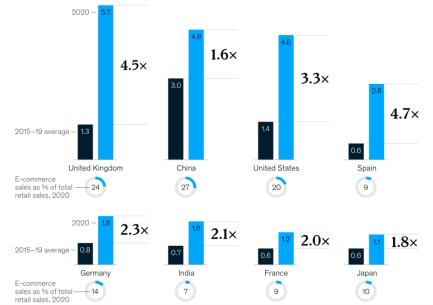
Online shopping has been steadily increasing over the past years. But it has never been this crazy. After the emergence of Covid, consumers went all-in, with e-commerce expansion almost quadrupling in the United Kingdom, for example. Other nations saw significant gains as well.
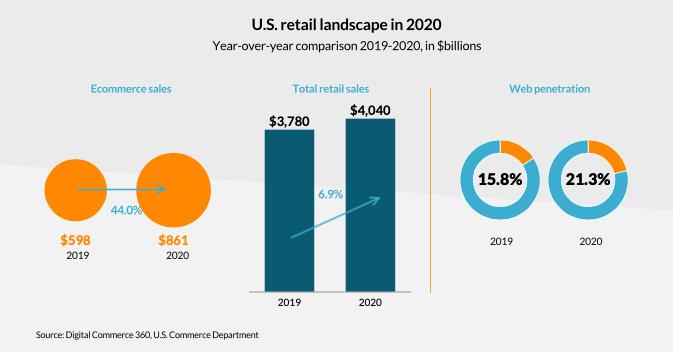
According to the new Digital Commerce 360 report, consumers spend $861.12 billion digitally with US merchants in 2020, up 44.0 percent from $598.02 billion in 2019. Last year, online spending accounted for 21.3 percent of all retail transactions, up from 15.8 percent the year before.
To know more about how you could take part in the E-commerce trend, you could click the FondMart logo to switch to the shopping mart page or just tap here,
Wrap up

The world is going through big changes. "Change is the one constant in cities, change is exciting and change is the engine of progress." India and China have adopted digital technologies and E-commerce trading models to support the growth of their economy, and enhance a more connected community.
Although there are still a lot of uncertainties in terms of the spread of viruses and the validity period of vaccines, where there is a will, there is a way.
Subscribe for latest update
We will keep you updated with FondMart's style news.
Popular Blogs





